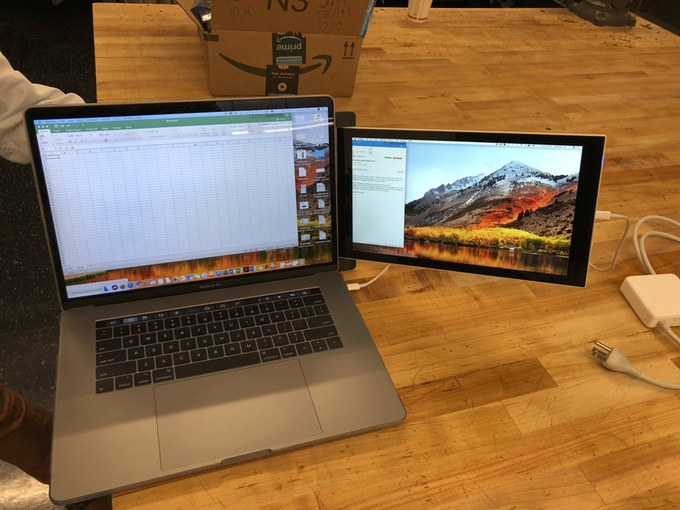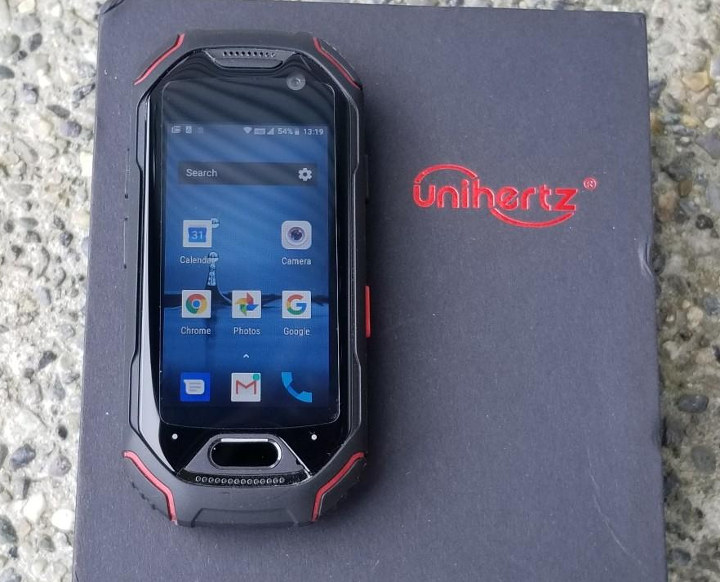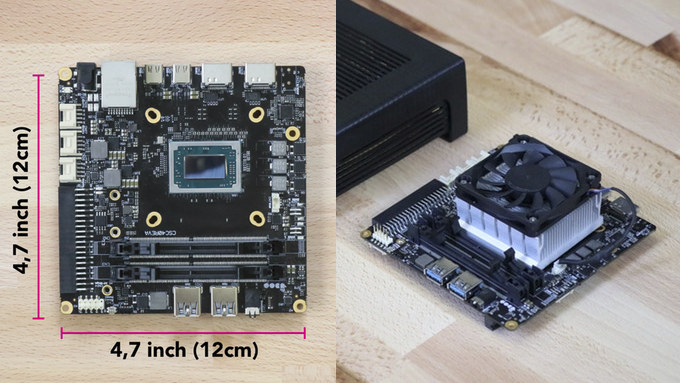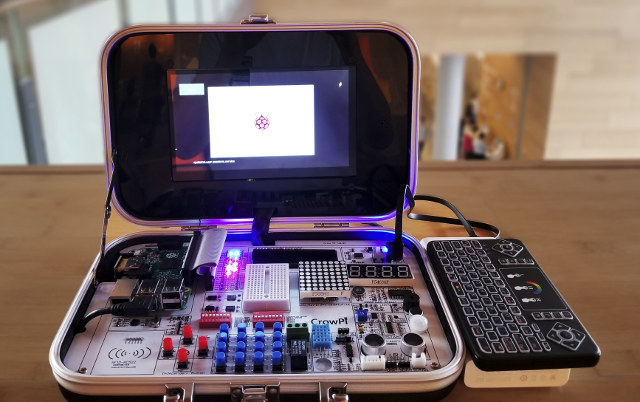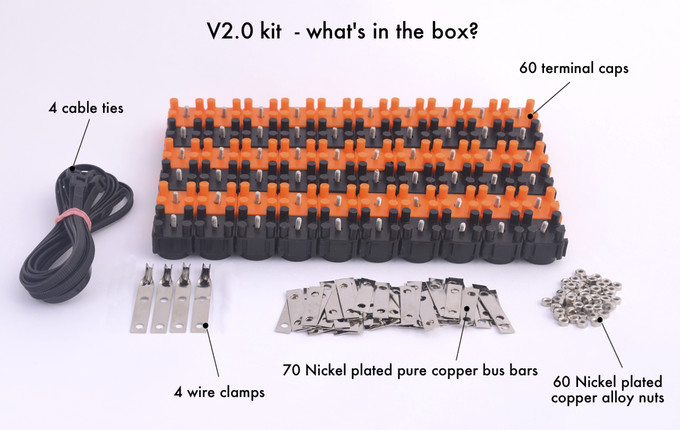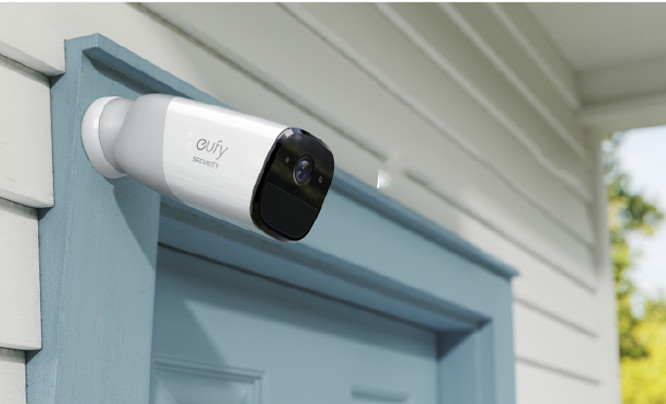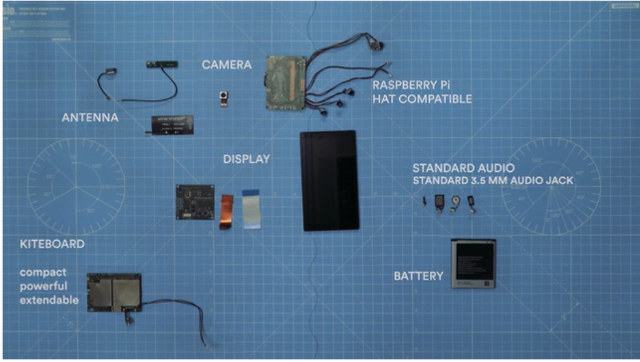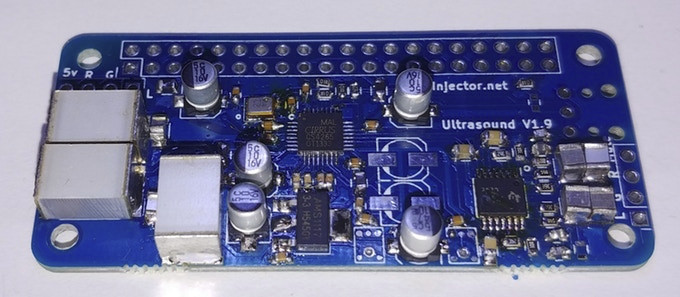I’m using a dual monitor setup at home since it’s just more convenient and increases productivity, but when I’m on the go, I have to revert to the single screen on my laptop. The guys at Mobile Pixels decided it was not good enough, and worked on providing a solution that allows you to take that dual display setup on the go. This gave birth to DUO, a screen that attaches to the back of your laptop, and that you can slide to the left or right of your laptop’s screen to add another display whether you may happen to be. DUO display specifications: Display Size & Resolution – 12.5″, 1920×1080 pixels Rotation – 270º full rotation, 180° presentation mode Connection – USB type C for power and video signal Power Consumption – 1.6 Watts; 0.3W in “rest mode”. Dimensions – 32.5 x 21.8 x 1.2 cm (ABS plastic) Weight […]
Unihertz Atom is an Android 8.1 Phone with a Tiny 2.4″ Display (Crowdfunding)
What we used to call phablet – smartphones with 5″ to 6″ display – are now simply called smartphones, as most companies now offer smartphones with larger displays since they are better suited for tasks like web browsing. Unihertz has gone the other way by launching Atom, an Android 8.1 smartphone with a tiny 2.4″ display. Demand does exist for such Phone, as while the Kickstarter campaign started a couple of days ago, the company has already raised close to $700,000 from around 3,000 backers. The “Atom” name clearly infringes on Intel’s trademark, so the model name is likely to change in a few days as has happened for “Atomwear” and “Nerdonic Atom X1“, but this did not affect the campaigns after they changed the names. Unihertz Atom smartphone specifications: SoC- Unnamed octa-core processor clocked at up to 2.0 GHz System Memory – 4GB RAM Storage – 64GB internal storage […]
UDOO BOLT AMD Ryzen Embedded V1000 SBC Goes for $229 and Up (Crowdfunding)
While Intel has been outing low cost and low power processors with less than 10W TDP over the years with their Bay Trail, Cherry Trail, Braswell, Apollo Lake, and now Gemini Lake processors, AMD has not really ventured into the low power space, and the latest announcements about 10-12W processors was for their Embedded G-Series J Family, which I have not seen in many products. More recently, the company introduced Ryzen Embedded V1000 family of processors with 4 to 8 Zen cores, 4K support, 10 GbE interface, and more with a TDP of 12 to 25W for Ryzen Embedded V1202B & V1605B dual / quad core processors. The latest x86 UDOO board – dubbed UDOO BOLT – will be one of the rare AMD development boards available on the market with pricing starting at $229. Two versions of the board will be available: UDOO BOLT v3 with Ryzen Embedded V1202B, […]
CrowPi is a Portable Learning Kit for Raspberry Pi 3 B+ / Zero Boards (Crowdfunding)
We have an embarrassment of choices for Raspberry Pi accessories from touchscreen displays, HAT add-ons boards, sensors, breadboard, and so on, as well as good software and support from Raspberry Pi forums. This is all good, but it can be messy with all those jumper cables, and not really portable. Elecrow has a neat solution with the CrowPi learning kit for Raspberry Pi 3 and Raspberry Pi Zero that come with a 7″ display, several sensors, buttons, a breadboard, and more all packed in a small suitcase. Main parts of the kit: 7″ touchscreen display Breadboard with GPIOs status LEDs Input modules – Light sensor, IR receiver, PIR motion sensor, sound sensor, temperature & humidity sensor, touch sensor, ultrasonic sensor, NFC reader, and tilt sensor Output modules – 8×8 LED matrix, 4-digit LED display, I2C LCD1602 display, buzzer, vibration motor, relay module, 9G servo, and stepper motor. Control modules – […]
Easily Make DIY Battery Packs with this Building Kit for 18650 Batteries (Crowdfunding)
If you have a project that requires some serious battery power, and can’t find a battery pack that matches your requirements, making your own is possible, but usually expensive as the commonly used spot welding method requires expensive tools. Vruzend has created a modular lithium-ion battery building kit that greatly ease the making of DIY battery pack using 18650 battery cells using caps, nuts and bolts. There are two versions of the kit: V1.5 kit which supports up to 3.5A continuous and 7A peak per cell, and for higher power levels, the new V2.0 kit can handle up to 20A continuous (25A peak) per cell thanks to nickel plated copper-based conductors. It makes it suitable for EV racing, high power battery banks, and other power-hungry projects. The short video below explains how the kit works. https://www.kickstarter.com/projects/1354698863/diy-li-ion-battery-building-kit-make-your-own-1865?ref=nav_search&result=project&term=diy%20battery Vruzend battery build kit is now offered on Kickstarter, and the projects has been […]
Eufy EverCam Full HD Waterproof WiFi Security Camera Works for Up to a Year on a Single Battery Charge
Wired security cameras can be troublesome to installed due to the cabling required, but luckily there are solutions to avoid all those long cables with solar powered IP cameras, or battery powered IP cameras. A few years ago I wrote about Immedia Blink WiFi HD camera that claimed to last a year on a charge, and despite several complains on Kickstarter, they seem to still be in business. There’s now a more advanced model by Eufy – an Anker brand – that supports 1080p video recording with motion sensing and face recognition, that also lasts up to one year on a charge, and offers free storage. Eufy EverCam specifications: Resolution – 1080p Video Format – H.264 High profile Image Sensor – Sony Exmor IMX323, 1/2 9-inch Field of View (FoV) – 140° Night Vision Range – up to 10 meters Digital Pan & Zoom – Yes, up to 8x Motion […]
Kite is an Open Source Hardware Android Smartphone Powered by Snapdragon 450 Processor (Crowdfunding)
Kite is an open source hardware Android phone kit specifically targeting makers which you can assemble yourself into a Kitephone. The phone is based on a Qualcomm Snapdragon 450 mainboard (Kiteboard v2), and comes with a 720p touchscreen display module, a 12MP camera, antennas, buttons, a 3,000 mAh battery, and a Raspberry Pi HAT compatibility board to optionally interface to external hardware. Kiteboard v2 specifications: SoC – Qualcomm Snapdragon 450 octa-core Arm Cortex A53 @ 1.8 GHz with Adreno 506 GPU System Memory – 2 GB RAM Storage – 16 GB storage + microSD card slot Connectivity Cellular LTE Cat. 6/3G/2G, 2x nano SIM slots (dual-SIM dual standby) Two variant North America with LTE FDD Bands: 2,4, 5, 7, 12, 13, 14, 25, 26 LTE TDD Bands: 41 WCDMA 850, 1700, 1900, 2100 GSM 850, 1900 Rest of the World (Europe, Russia, etc…) LTE FDD Bands: 1, 3, 5, 7, […]
Flatmax Studio Audio Injector Ultra Sound Card is Designed for Raspberry Pi Boards (Crowdfunding)
Flatmax Studio has launched several audio cards for Raspberry Pi boards on Kickstarter in recent years, and their latest board is called “Audio Injector Ultra Sound Card”. The board is said to give high fidelity input and output audio @ 192 kHz, is equipped with digital output (S/PDIF) and offers dual microphone capability. An extra balanced HAT – will send and receive balanced stereo input and output – is also available. Specifications: Direct Inputs – Unpopulated Analogue Connectors (stereo RCAs provided) Direct Outputs – Unpopulated Analogue Connectors (stereo RCAs provided), Digital Optical SPDIF (Optical transducer provided) Potentiometer Inputs – Unpopulated Connectors and potentiometer (stereo pot. not provided). Potentiometer Outputs – Unpopulated Connectors and potentiometer (stereo pot. not provided). Microphone – 2x high quality ultrasound (model – SPU0410LR5H) surface mount microphones populated Audio Codec – Cirrus Logic CS4265 stereo codec Sample rate – 192 kHz, 24 bit Jitter control – Low […]


